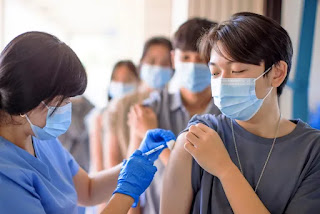VACCINES FOR TEENS(DRAFT NO.4)
On 13 September, the UK chief medical officers recommended that all 12-15 year olds be offered a single dose of Pfizer-BioNTech covid-19 vaccine.1 This followed a previous recommendation by the Joint Committee on Vaccination and Immunisation2 not to offer covid-19 vaccines to healthy 12-15 year olds. The UK now joins a growing list of countries offering vaccination to those aged 12 and over, but it is providing only one dose rather than the two given in other countries because of concerns about rare side effects such as heart inflammation.34
The health benefits of covid-19 vaccination are small in this age group since covid-19 infection is not a serious threat to their health.5 However, the chief medical officers’ decision was influenced by the wider benefit of reducing further disruption to education. Parents are understandably concerned about vaccine safety. It’s not yet clear how schools and healthcare professionals will cope with delivering up to 2.6 million covid-19 vaccines, answering parents’ questions,6 and supporting teenagers to make informed decisions.
The case for offering covid-19 vaccines to healthy teenagers is less compelling than the case for routine childhood vaccinations, which have direct benefits for individuals and many years of safety data. Healthy teenagers are at extremely low risk of hospital admission and death from covid-19 infection,5 although vaccines do protect against symptoms such as headache and fatigue that can last beyond 12-16 weeks in a very small proportion of teenagers.7 Additional benefits may be limited, as 30-50% of teenagers may already have acquired natural immunity to covid-19.8
Most adolescents aged 12-15 who received the Pfizer-BioNTech vaccine in clinical trials or during mass vaccination in North America34 reported only minor transient side effects such as fainting and pain from the injection site (79-86%).9 Other reactions include fever, fatigue, and muscle pains (64%) and headache (49%) lasting up to a week.349 However, a few cases of heart inflammation (pericarditis and myocarditis) have been reported, affecting boys more than girls.10 The risk of myocarditis after this vaccine rises from 3-17 cases per million after one dose to 12-34 cases per million after a second dose,24 and this informed the UK decision to offer only one dose to under 16s. To date, no deaths are known to have occurred as a result of myocarditis following vaccination, but long term effects are unknown. The risk of myocarditis associated with covid-19 infection may be higher than that after vaccination, but more research is needed to weigh risk against benefit.10 Importantly, past covid-19 infection does not seem to increase risk of myocarditis after vaccination.


Comments
Post a Comment